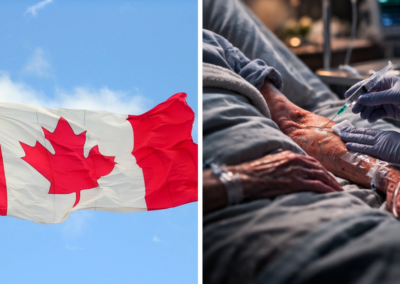A Canadian mother has asked the Canadian government to extend euthanasia to children so a lethal injection might be given to her son.
Karie-Lyn Pelletier, from L’Islet, says she will wish to end the life of her four-year-old son, Abel, if his condition becomes worse. Abel was born with Mednik syndrome, a genetic condition that means he is deaf and has severe learning disabilities and intestinal problems.
Miss Pelletier has said she wants euthanasia to be “the end that will deliver Abel from his sufferings and the fight he leads”.
She has received support from Senator Pierre-Hugues Boisvenu, who worked on Bill C-7.
Euthanasia has been legal in Canada since 2016. In 2019 however, following the euthanising of Alan Nichols, a former school caretaker who was physically healthy but struggled with depression, the legal requirement that a person be terminally ill before administration of euthanasia was dropped.
Bill C-7, passed by the Canadian Parliament in March this year, further extended euthanasia legislation to people with disabilities and those with mental health issues, over the age of eighteen.
Boisvenu wishes Miss Pelletier to testify before the Canadian Senate, the upper house of Canada’s parliament, modelled on the British House of Lords, while a parliamentary committee considers whether to extend euthanasia to children, a campaign that began in 2018.
This proposal has met with fierce criticism from disability rights campaigners in Canada and beyond.
Wheelchair racing legend and eleven-time Paralympic gold medallist Baroness (Tanni) Grey-Thompson has said: “This is the very fear that disabled people have – that assisted suicide will be used to get rid of disabled people”.
“While repeatedly we are told it is ’not for us’, this will set a path that will continue to ramp up the view that disabled people have nothing to contribute to society”.
“It flirts with the idea that some lives are not worth living”
Dr Miro Griffiths, an editor for the International Journal of Disability and Social Justice, and Leverhulme Research Fellow at the University of Leeds’ Centre for Disability Studies, said the case exemplified the dangers of extending the scope of assisted suicide legislation.
He explained, “Assisted suicide and euthanasia interventions will alter how health and care provision is offered to disabled people, and those with illnesses and health conditions, in society”.
“Rather than prioritise support for disabled people to participate in communities, debates will take place as to whether an individual’s death should be accelerated via state and medical opinion”.
He went on: “This is one of the reasons why the Meacher Bill is dangerous – it flirts with the idea that some lives are not worth living”.
Pushing the boundaries
Chair of the pro-assisted suicide group, ‘Dignity in Dying’, Baroness Meacher’s private member’s bill on assisted suicide received its First Reading in the House of Lords on 26 May this year, and a Second Reading is expected in the autumn.
The Bill follows the Marris-Falconer Assisted Dying Bill (2015), which was defeated by a majority of 330 to 118 MPs.
According to supporters of the Bill, Dignity in Dying, “[t]he bill is modelled on legislation that has been in place in Oregon, USA for over 23 years […]”.
Other countries that have introduced supposedly restricted assisted suicide and euthanasia legislation have seen an expansion of their laws as medical professionals and activists push the boundaries of acceptable practice.
Expanding euthanasia law in Europe
In the Netherlands and Belgium, the law that permits euthanasia has rapidly expanded to include more categories of people.
Belgium legalised euthanasia in 2002 and since then, the practice has even been extended to children. The current law allows euthanasia if the patient is in a state of constant physical or psychological pain.
There is now a renewed push for euthanasia to be available for those who are healthy but have decided they have led a ‘fulfilled life’.
In the Netherlands, where euthanasia has been legal since 2002, doctors are now permitted to secretly sedate patients who have dementia before euthanising them. The law permits voluntary euthanasia for anyone over the age of 16, and children aged 13-15 can be euthanised with their parents’ consent.
Last year, the Dutch government said it would be changing the regulations to allow doctors to end the lives of terminally ill children between the ages of one and twelve.
A spokesperson for Right To Life UK, Catherine Robinson, said: “As so many pro-life voices have repeatedly warned, no matter how well-intentioned, the legalisation of assisted suicide in certain circumstances will almost inevitably extend to the non-terminally ill who are suffering, as it already has in Canada, and it is therefore worrying but hardly surprising that Miss Pelletier and various other campaigners are pushing for it to be extended to children”.
“It is no coincidence that many prominent people with disabilities such as Dr Griffiths, disability rights groups, and many respected healthcare professionals continue to rally against such legislation, for it strikes against the very heart of the dignity and care we ought to afford to each human being”.












